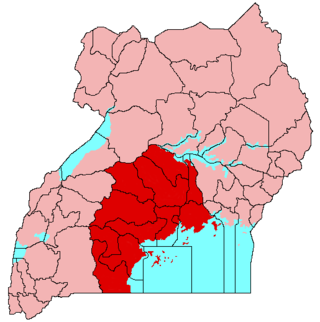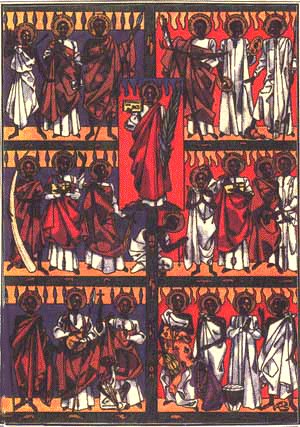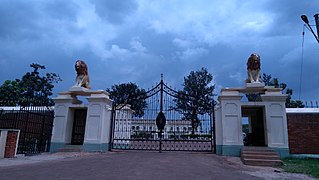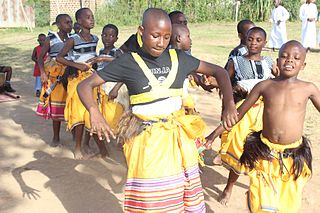
Kampala is the capital and largest city of Uganda. The city proper has a population of 1,875,834 (2024) and is divided into the five political divisions of Kampala, Kawempe, Makindye, Nakawa, and Rubaga.

Buganda is a Bantu kingdom within Uganda. The kingdom of the Baganda people, Buganda is the largest of the traditional kingdoms in present-day East Africa, consisting of Uganda's Central Region, including the Ugandan capital Kampala. The 14 million Baganda make up the largest Ugandan region, representing approximately 16% of Uganda's population.

Sir Edward Frederick William David Walugembe Mutebi Luwangula Mutesa II was Kabaka, or king, of the Kingdom of Buganda in Uganda from 22 November 1939 until his death. He was the 35th Kabaka of Buganda and the first president of Uganda from 1962 to 1966, when he was overthrown by Milton Obote. The foreign press often referred to him as King Freddie, a name rarely used in Uganda. An ardent defender of Buganda's interests, especially its traditional autonomy, he often threatened to make the kingdom independent both before and after Uganda's independence to preserve it. These firm convictions also later led to conflicts with his erstwhile political ally Milton Obote, who would eventually overthrow him.

Kabaka Ronald Edward Frederick Kimera Muwenda Mutebi II is King of the Kingdom of Buganda. He is the 36th Kabaka of Buganda.

The Conservative Party (CP) is a centre-right political party in Uganda. It is led by Ken Lukyamuzi.

Kabaka is the title of the king of the Kingdom of Buganda. According to the traditions of the Baganda, they are ruled by two kings, one spiritual and the other secular.
Kimera was Kabaka of the Kingdom of Buganda between 1374 and 1404. He was the third king of Buganda.

Adolphus Ludigo-Mkasa, also known as Adolofu Mukasa Ludigo, Adolf Mukasa Ludigo was a Ugandan Catholic martyr killed for his faith.

Ngoma are musical instruments used by certain Bantu populations of Africa. Ngoma is derived from the Kongo word for "drum". Different Bantu-inhabited regions have their own traditions of percussion, with different names for their instruments. In Kikongo, "ngoma" is used by extension to signify specific dances, social occasions, and rhythms. In Swahili, Ngoma music is used to describe music, dance, instruments including the drums, and events together as a joint cultural practice.
The Buganda Crisis, also called the 1966 Mengo Crisis, the Kabaka Crisis, or the 1966 Crisis, domestically, was a period of political turmoil that occurred in Buganda. It was driven by conflict between Prime Minister Milton Obote and the Kabaka of Buganda, Mutesa II, culminating in a military assault upon the latter's residence that drove him into exile.

The history of Buganda is that of the Buganda kingdom of the Baganda people, the largest of the traditional kingdoms in present-day Uganda.

Mengo is a hill in Rubaga Division, Kampala, Uganda's capital and largest city. The name also applies to the neighborhood on that hill.
Namirembe is a hill in Kampala, Uganda's capital and largest city. It is also a common name given to girls in several Baganda clans. Namirembe comes from the Luganda word "mirembe" meaning peace. Namirembe loosely translates into Full of Peace. Legend has it that this hill was a gathering place for celebrating peace or war victories.

The Kasubi Tombs in Kampala, Uganda, is the site of the burial grounds for four kabakas and other members of the Baganda royal family. As a result, the site remains an important spiritual and political site for the Ganda people, as well as an important example of traditional architecture. It became a UNESCO World Heritage Site in December 2001, when it was described as "one of the most remarkable buildings using purely vegetal materials in the entire region of sub-Saharan Africa".

The Baganda also called Waganda, are a Bantu ethnic group native to Buganda, a subnational kingdom within Uganda. Traditionally composed of 52 clans, the Baganda are the largest people of the Bantu ethnic group in Uganda, comprising 16.5 percent of the population at the time of the 2014 census.
Katikkiro is the official title of the head of cabinet and government in Buganda under the Kabaka of the Kingdom of Buganda. He is the equivalent of a Prime Minister is some governments but the Katikkiro does not assume office through elections like in other countries. His authority is symbolized by the Ddamula stick which is given to him by the Kabaka as a tool to 'kulamula' in the kingdom on his behalf. Buganda is a traditional kingdom in modern-day Uganda located in the central region of the East African country. The current Katikkiro is Mr. Charles Peter Mayiga of the Mutima clan and was appointed by the current monarch, the Kabaka of Buganda, Muwenda Mutebi II of Buganda in May 2013, replacing Engineer John Baptist Walusimbi.

The Butikkiro is the official residence of the Katikkiro of Buganda in Uganda. It derives its name from the official residence of the Katikkiro and it is where he hosts the official guests when not at his office in the Bulange building. The Butikkiro also acts as the final confirmation place of any person appointed to the office of Katikkiro. It is where one has to keep or reach with the royal mace (Ddamula) after it has been handed over to him. If the Katikkiro (designate) fails to deliver Ddamula at Butikkiro, he then cannot rule on behalf of the Kabaka.

Twekobe aka Twekobe Palace is the official residence (building) for the Kabaka of Buganda and it is located with in the Lubiri. Its Wiki Loves Monuments ID: UG-C-048.

Bakisimba dance (Baakisiimba) also known as Nankasa or Muwogola is a traditional dance form originating from the Baganda people of Buganda Kingdom in Central Uganda. It is believed to have originated from the movements of a drunken King Ssuuna of Buganda Kingdom. The dance was initially performed in the Buganda Royal Court in ancient times an it holds significant cultural and social importance within the community and is often performed during tribal ceremonies, celebrations, and festive occasions.

Amaggunju is a traditional folk dance of the Baganda, who represent the largest ethnic community in Uganda. This royal dance is performed during important occasions such as coronations, weddings, and other cultural events. Notable features of the dance are its distinct rhythmic drumming and energetic movements, executed by both male and female performers.
















